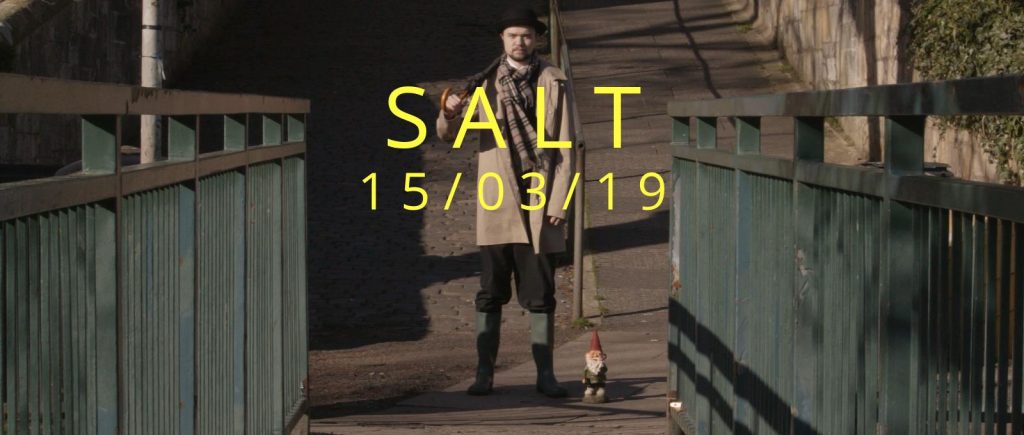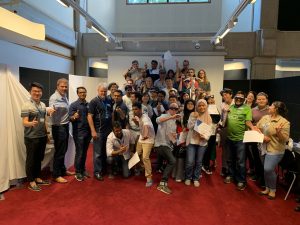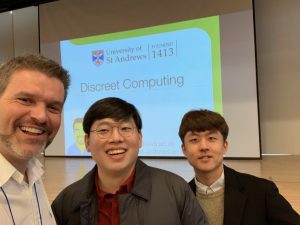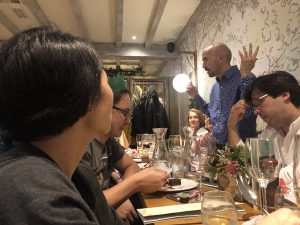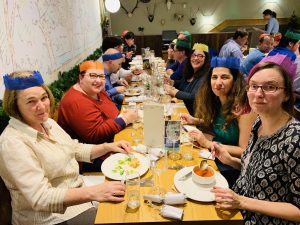Iain Carson attends IUI Summer School in Haifa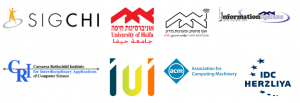

The old city of Jaffa, Tel Aviv, at sunset
I was recently fortunate enough to be accepted to the
Intelligent User Interfaces Summer School in Haifa, Israel – a series of talks and workshops encouraging generation of ideas and collaborations in the era of IoT and smart environments, with consideration for the use of technology in cultural heritage as a focal point for the presentations and discussions.
As there is no direct flight between Edinburgh and Israel, I arrived keen yet bleary-eyed in Tel Aviv at 4.30am just a couple of days before the conference; just enough time to recover and get to grips with the country before having to check in at the workshop.

Narrow streets of Jaffa
Tel Aviv greeted me with wall to wall sunshine and a scorching air temperature of 30degC. My explorations of the ancient city of Jaffa (the oranges were really grown here, but the cakes are just riding on their fame) showed me that Israel is a country proud of both its incredible history and its technological prowess.
In Jaffa, the stone-clad, narrow streets of the old town create a winding labyrinth built on foundations of the ancient Egyptians, modifications of the Israelites, then Phoenicians, further fortifications from the Ottoman Empire, elements of destruction at the hand of Napoleon, all falling through dereliction to be processed by modern rehabilitation efforts. Amongst the art and architecture sit bakeries, a sprawling flea market and numerous falafel kiosks, many observing a strict closing at midday on Fridays to celebrate Shabbat. Somehow, these layers of a rich Arabian history embedded in the crumbling stonework sit in stark contrast to the Silicon Valley-esque ideals one may have on the origin of Israel’s numerous internationally-recognised tech start-ups, which include
Waze,
Wix,
Viber,
Gett and
Cortica, and the Israeli-only but nonetheless impressive
Pango.
With its rich cultural heritage and strong tech foundations, Israel is a fitting location for the IUI summer school and its focus on the use of technology in cultural heritage.

Introduction to Acre
The summer school took part in
Haifa, some 90km North of Tel Aviv, at the
University of Haifa. With the air-conditioning set to max, we attended a series of stimulating talks by researchers from around the world. Topics covered a broad range of technologies, not exhaustively from
“smart objects” in museums (presented by Massimo Zancanaro) to blind navigation aids (Jeremy Cooperstock), robots (Cristina Gena) to relics, and
city-guide drones (Jessica Cauchard) to animal interfaces (Anna Zamansky). Even with such diversity, all talks were tailored to prime our minds for the pinnacle task of the summer school – working in small groups to ideate, design and present a realistic technological research proposal. We were encouraged to consider how cutting-edge technology may improve accessibility and engagement with cultural heritage, and after an afternoon brainstorming we were left with a real feeling of excitement for the task ahead.

Acre’s ancient sea wall
The next day, an excursion to the
UNESCO world Heritage site Acre demonstrated some excellent applications of technology in cultural heritage, where projectors, sound systems, interactive displays and some beautiful visual effects provided new pathways for our minds and senses to navigate between the physical and the information space. We were encouraged to think strongly about how our ideas and developments may be used in such contexts, but equally to learn from the (hit and miss) effectiveness of such technologies in the wild, which may influence our decisions.

Group presentation of SHIP – the Special Hecht Interaction Playground
It became clear that while good tech can increase engagement and enrichen the museum experience, poorly implemented interfaces can be tedious enough to elicit frustration, or so stimulating that they distract altogether from the exhibit, defeating their purpose.
With the talks and first-hand experience in mind, our group of 5, representing an age range of 30 years and spanning multiple nationalities, settled on the presentation of a series of interactive podiums and a collaborative exploration table for the
Ma’agan Mikhael ancient ship exhibition

Sarona Market – not your average Arabian flea market!
A lot of work went into the presentation of the idea, and we hope to develop the foundations into a project proposal and framework for improving child engagement with non-physical or ancient exhibitions through roleplaying in a collaborative, gamified environment.
After the presentations I was left to explore the towering skyscrapers of new Tel Aviv, navigating the shopping malls and their app-powered coffee and burger chains to acquire yet another perspective on this inspiring culture.
Alongside my undeniable tan and plethora of new contact details, my week in Israel had left me with plenty to think about on my journey back to a sunny, yet undeniably chilly, Edinburgh.
My sincere thanks go to
SIGCHI,
School of Computer Science and the
ACM for the financial and logistical assistance in travelling to and staying in Israel, enabling such an excellent experience.

Everyone at the IUI Summer School in Acre
 As CHI 2019 is held just around the corner in Glasgow, SACHI will be in full force at the conference, and keen to engage and speak about collaborations and research visits at St Andrews.
As CHI 2019 is held just around the corner in Glasgow, SACHI will be in full force at the conference, and keen to engage and speak about collaborations and research visits at St Andrews.

